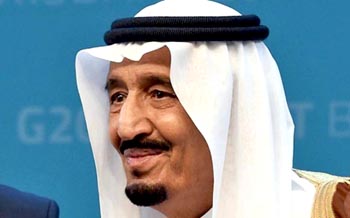Riyadh, Jan 11: King Salman was pronounced winner of the King Faisal International Prize (KFIP) for his service to Islam at an event held in Riyadh on Tuesday.
 Makkah Governor Prince Khalid Al-Faisal, adviser to the king, CEO of the King Faisal Foundation and chairman of the KFIP Commission, made the opening speech to announce the winners at a press briefing at Al-Khozama Center.
Makkah Governor Prince Khalid Al-Faisal, adviser to the king, CEO of the King Faisal Foundation and chairman of the KFIP Commission, made the opening speech to announce the winners at a press briefing at Al-Khozama Center.
The award ceremony was attended by members of the selection committees, leading scholars, scientists, intellectuals and media representatives.
Prince Khalid said King Salman’s award was in recognition of his commitment to serving the two Holy Mosques and their visitors and pilgrims.
“He was my model and mentor,” the prince said, wishing him longevity and good health.
The prize for Islamic studies was awarded to Ridwan Al-Sayyid, a professor at the University of Lebanon, for his research and studies of Arabic Islamic jurisprudential and political heritage.
The prize for Arabic language and literature was awarded to the Arabic Language Academy of Jordan, for its efforts to transfer science
and technology via translation, Arabize technical terms, publish specialized glossaries and make Arabic a language of instruction.
Tadamitsu Kishimoto, professor of immunology at Osaka University, Japan, was named winner of the prize for medicine.
Kishimoto, through his work of more than 30 years, is responsible for discovering interleukin-6 (IL-6), its receptor and signaling pathways.
He established the physiological function of the interleukin-6 (IL-6) pathway and its role in inflammatory/autoimmune diseases.
Subsequently, he developed an interleukin-6 (IL-6) receptor-blocking antibody into a biological therapy, leading clinical development of this therapy toward first approval for the treatment of rheumatoid arthritis.
The prize for science was shared by Daniel Loss, professor of physics at Basel University, Switzerland, and by Dutch Professor Laurens Molenkamp of Wurzburg University, Germany.
Loss is a pioneer in the theory of spin dynamics and spin coherence in quantum dots showing promise for practical applications in spin quantum computers.
The idea is to use the spin rather than the charge of electrons trapped in quantum dots as quantum bits.
His work has inspired many important experimental programs. Loss’ contributions open the door to powerful spintronic quantum computers with exceptional speed and storage capacity.
Molenkamp has significantly contributed to the experimental field of spintronics.
His work includes ground-breaking methods for creating and manipulating spin-polarized charge-carrier states in semiconductors, with the potential to develop magnetic storage devices.
Molenkamp has experimentally confirmed the quantum spin-Hall effect, which firms up the field of topological insulators, a novel form of quantum matter.





Comments
Add new comment